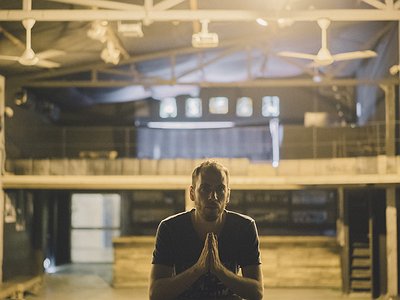Part 2
How do you make use of technology? In terms of the feedback mechanism between technology and creativity, what do humans excel at, what do machines excel at?
It is incredible what machines can do and I like to treat them just like another instrument in my setup. The infinite possibilities of electronics sometimes hinder us to access directly what we are hearing inside. Once I start to browse for a technical solution the creative focus is almost certainly gone. I use my setup to help me capture and inspire the ideas.Humans are imperfect and it is this imperfection that creates an emotion that touches us. I try to never let the digital world take that away.
Collaborations can take on many forms. What role do they play in your approach and what are your preferred ways of engaging with other creatives, including the artists performing your work?
Collaborations are crucial to what I do. I love to exchange with artists and getting inspired by their vision.Over the years I have realised many duo projects. The process of encounter and writing music together is always new and different. Our common goal in all of them though is to achieve a healthy balance of our distinct influences. Just like in a conversation both people must listen and talk. Getting this balance right is always a sensitive process. I think over the years I have learned to relax a little more and just let the music take shape naturally.
How is writing the music and having it performed live connected? What do you achieve and draw from each experience personally? How do you see the relationship between improvisation and composition in this regard?
Without live performances composing would be dreadful activity! In my work, I like to know who the musicians will be and know their personalities a little too.Ideally, I like to write for musicians, not just instruments. Composing is about imagining sounds in your mind. The moment it gets on stage and is shared with audiences it is like a ship that left for the sea. You no longer have control over it.This can be hard but it also is rewarding because it allows you to let your baby go and move on to the next challenge from a blank slate. Time is a variable only seldomly discussed within the context of contemporary composition.
Can you tell me a bit about your perspective on time in relation to a composition and what role it plays in your work?
Time is like the size of the canvas that I choose to paint on. It dictates the frame and the way I can place my ideas in it. Depending on the time duration I start to think about the number and sequence of ideas that I am able to string together.What kind of arch can I use to tell me story? Yes time is hugely important factor.
How do you see the relationship between the 'sound' aspects of music and the 'composition' aspects? How do you work with sound and timbre to meet certain production ideas and in which way can certain sounds already take on compositional qualities?
Sound is music. I treat it that way. It is not what we play but how we play it. The older I get the more courageous I become in using simple sounds and letting them breathe to tell a story. Within my collection of percussion instruments, I always look for sounds that can tell a story without shouting or raving. The textures that can be produced from the simplest way of playing an instrument often create the bed and the atmosphere for the melodic narratives to follow.
Our sense of hearing shares intriguing connections to other senses. From your experience, what are some of the most inspiring overlaps between different senses - and what do they tell us about the way our senses work? What happens to sound at its outermost borders?
As humans, we are able to take in so many impressions through our senses. Sadly, nowadays our senses get constantly overloaded with capitalist marketing noise. Whether we are in an elevator, in a shop or out in the street. Sounds and visuals constantly bombard us. For me, all senses are connected, and they feed us with information that we then process. I think about sounds like colours and textures. So already while listening to music all my other senses are getting triggered and fed with inspiration.
Art can be a purpose, but it can also directly feed back into everyday life, take on a social and political role and lead to more engagement. Can you describe your approach to art and being an artist?
When I was young, I was thinking about art in a more secluded manner. To create brilliant art was enough. The more I travel and relate to people all around the world I realised the meaning that art has in people's lives. It enables them to express and celebrate their cultural identities, relate to each other and feel a sense of community and belonging. Art gives us this chance of sharing.
Music does not come from music. It comes from personal experiences and allows us to express what we feel deep inside. For me, art is a savior and should always play a big role in society.
It is remarkable, in a way, that we have arrived in the 21st century with the basic concept of music still intact. Do you have a vision of music, an idea of what music could be beyond its current form?
Music is about emotion. This will always be the center of it. Whether we use harmony, melody or rhythm. Whether we use technology or organic analog instruments. Music is about emotion and it always will be.





